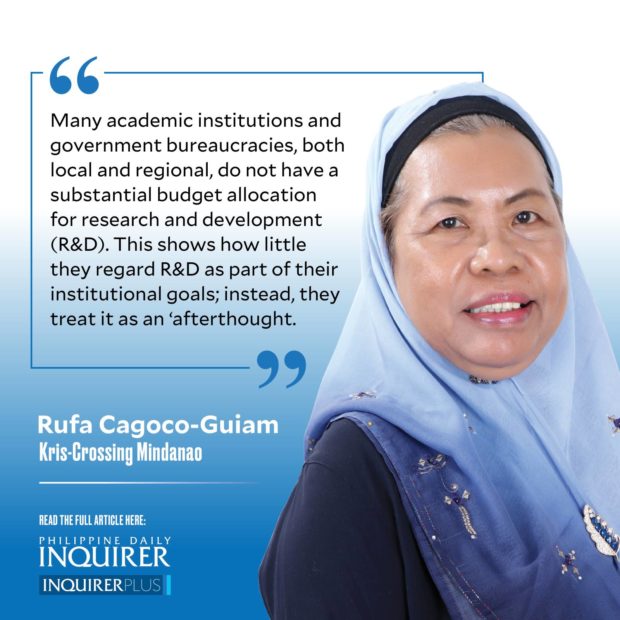Making R&D a priority (1)
Over the years of my work in and out of academe and with development donor agencies, I have realized that many academic institutions and government bureaucracies, both local and regional, do not have a substantial budget allocation for research and development (R&D). This shows how little they regard R&D as part of their institutional goals; instead, they treat it as an “afterthought.”
In the academe, professionally trained individuals are expected to be among the best in their respective academic disciplines. These individuals have become such after years of training, in post-graduate and other advanced forms of continuous learning to keep them abreast of the state-of-the-art development in their respective fields. With their prestigious three-lettered academic titles, they are expected to be among the first to be aware, and even adept, at new advances in technology used in improving learning outcomes among their students. But even the smartest individuals cannot share what they do not have in terms of training, experience, and expertise. As the old adage says, “you cannot give what you do not have.”
Arguably, this is an ideal that every academic institution strives for (even though this is not a common goal of educational institutions, especially among privately-owned ones that only look at profits above anything else). And because educational services have become lucrative, several enterprising individuals have cashed in on this field. Consequently, we have seen educational establishments sprouting like mushrooms almost everywhere in the country today. Institutes of various names and attributions are being put up in various localities, making education just like any other commodity that can be exploited for motivations aside from imparting knowledge and skills—like crass capitalistic ends.
There are many ways of doing continuous learning, and one of them is to constantly engage in doing research in the disciplinary fields we are trained in. Alternatively, together with same-minded colleagues, we can also do multidisciplinary research projects to enhance our analytical and thinking processes. These are among the goals of doing painstaking, tedious research into issues that plague our country today, especially among its impoverished and underdeveloped, geographically isolated areas.
While research is considered among the basic tri-functions of an institution of higher learning (like colleges and universities), it is among the activities that not many academics have developed a liking for and expertise in.
There are serious impediments to making research a part of an academic’s way of life, or even as a collective culture among a group of college professors. One of them is the lack of appropriate and adequate budgets for R&D projects for the different professional fields or expertise housed in one educational institution. It seems that academic institutions focus more inordinately on teaching, and, many times, teaching has become the end-all of being an academic. But I cannot also blame my fellow professors. In the past and in the present, university professors are heavily burdened with too many classes to teach in a week. Even at this time of the pandemic, the teaching loads have not been diminished.
When I started teaching at university in the early ‘80s, all teachers were given a full load of 24 units (24 actual teaching hours). Additional hours of preparation were also needed when they were given five different subject areas to prepare for their daily teaching duties. Above all, teachers were expected to revise syllabi for the subjects they teach, and advise students during their “free” hours (these are not free at all, they cannot use these hours for slacking off). In short, the whole 40 hours a week of teaching and related work were not enough; teachers slept late nights checking papers, writing examination questions, grading their students, etc. The list was quite endless and recurring—on a daily basis.
Given this constraint, teachers cannot exert additional effort to learn more about their respective fields by doing research and becoming experts in their fields.
But the more serious obstacle is the lack of adequate institutional budget allocations for R&D work, even in academic institutions.
(To be continued)
Comments to rcguiam@gmail.com





















